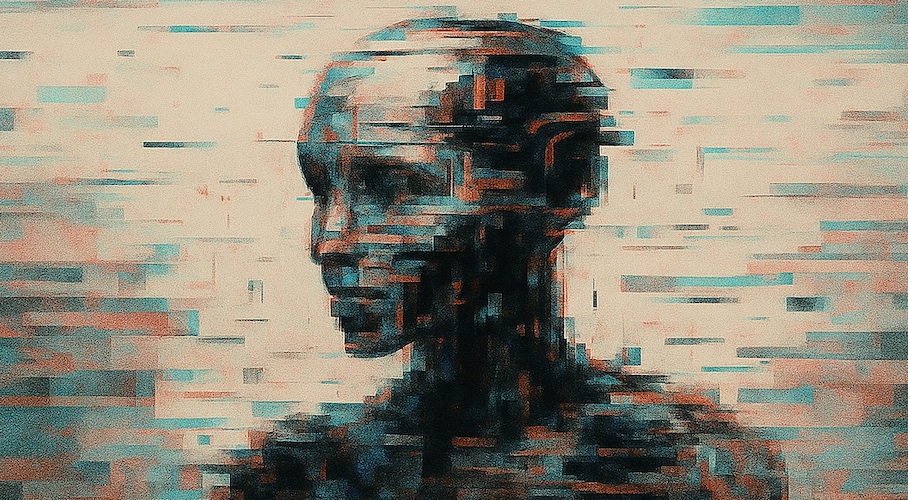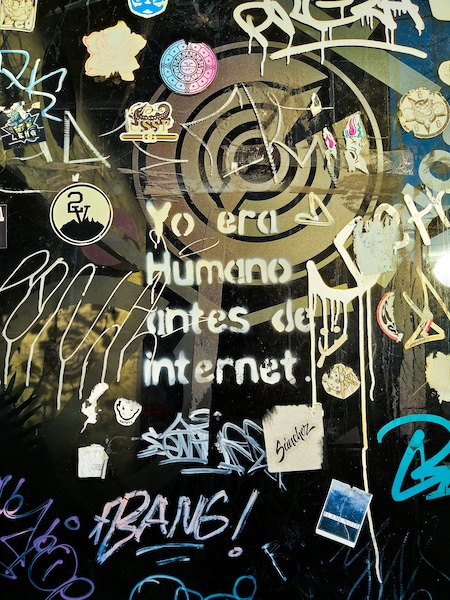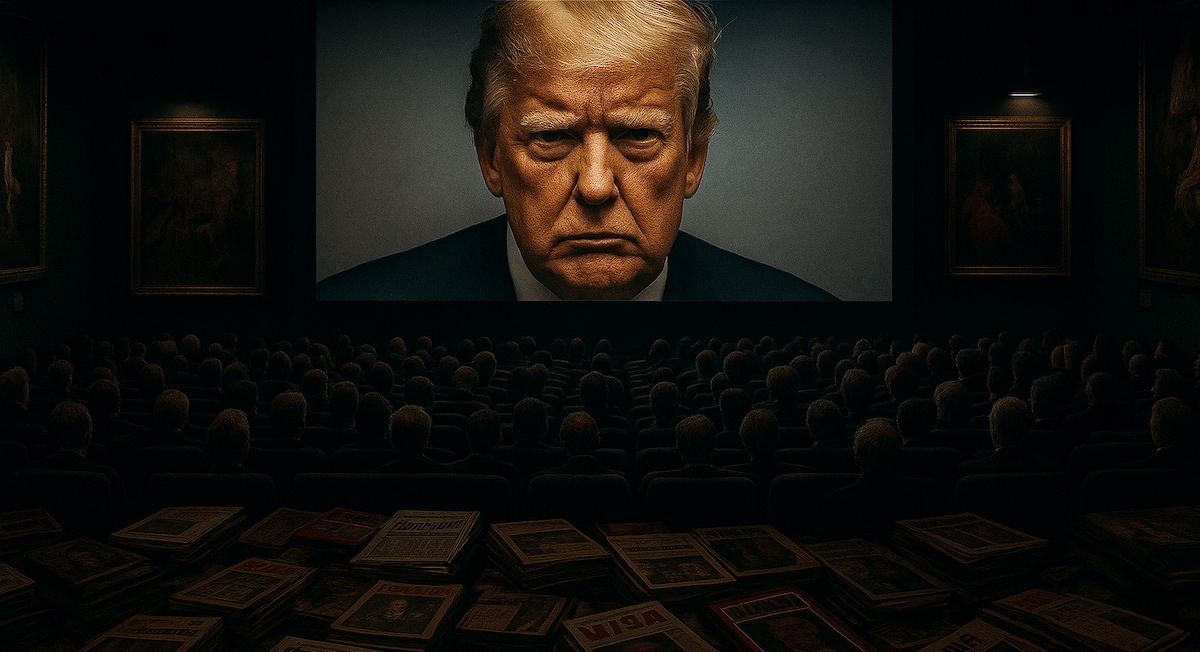
The universe does not allow perfection
Stephen Hawking
James Cameron had this vision of a world ruled by machines. Leaving Terminators aside and focusing on the core thesis of the film: According to this idea, on 29 August 1997 – one day after my 30th birthday – the artificially intelligent neural group brain Skynet develops its own consciousness. The rest is film history. If we listen to the current discussions, we may not be moving towards a nuclear war triggered by machines, but their takeover seems imminent. And, judging by the open arms of so many people, we are gladly handing over all our knowledge and workforce to cyber intelligence.
This piece isn’t about how we got here. The core issue of this article is: what makes us think this will all work out? Why does everyone believe machines will do everything better, liberating us from tedious work? And what are we going to do in the meantime?
Enter AI. The big revolution changing our lives forever. First of all, as a GenX dude I can tell you from the bottom of my heart (audio: grandpa-voice): I’ve heard and seen this before. Several times.
When computers became usable tools not limited to nerds. When Photoshop made us all photographers and Adobe gave us layout power. When digital recording entered the studio and we did not have to play songs ten times over until we got everything right. And of course when suddenly information popped up via Internet, coms became global and soon portable. On mobile phones that soon made my first Apple Classic look like the Lada it was.
Has it changed humanity? Absolutely. Has it changed our perception of quality? On the surface, yes. Not, however, in the way people think. It is a fact that many graphic designers, photographers and studio musicians have lost their jobs or shied away from even starting their dream career. And understandably so if one has to compete with machines that don’t need to get paid to live while clients don’t want craftsmanship but cheap and quick solutions. And to hell with quality .

Faster – Higher – Stronger
This is once again the big promise now coming from Ai and indeed it is on the verge of making production cheaper and giving the agency customer more power. But then it is also – again – compromising quality because far too many people without training or knowledge are suddenly capable of creative production overnight. If DTP already was a low-punch for quality back then, today we are confronted with a technology that literally does everything. On a lower level without an expert having to live-control it with functions, scripts and commands, turning anyone into the Lawnmower-Man. All we need to do is make a (s)wish with our GPT-wand and the result apparates. Or so it says on the package.
Don’t get me wrong: I am an avid user of AI myself. Just like I learned and used Photoshop, Quark XPress, ProTools and LogicPro. And it’s a lot of fun making me work a lot faster, no doubt. The new astonishing tools and image editing functions in Photoshop being one example. Another in the shape of frameworks for strategic texts, complex research analysis down to elaborate calculations using formulas. There is a lot of help available and many quick tools, which is a good thing. But let’s get back to creation.
Despite all the wonderful new tools, caution, modesty and honesty towards oneself are required here. In business I have learned the creative craft to the extent of knowing what I can do and what the machine can do. Most importantly, I know what we can’t do together and at which point I need to call in a professional. I can use AI for all simple, everyday business tasks up to strategic planning. I design prompts to get good information, structures or mood boards. I use frames, feed them with questions and information, and in a matter of seconds I can do a lot of work that otherwise would take me days. But can I trust it? No. Whatever comes back is reviewed and not released into the world with a quick swish. The thing doesn’t think. We still have to, actually.
First of all, it is important to understand that AI is not very “I” yet, not truly intelligent. In fact, it’s more “C” as it copies, collects and compiles information. Sure, it is certainly running on countless filters, routines, logic or even deep coding and programming. Then it delivers or designs whatever you are looking for. Or so you think. Let’s not kid ourselves: AI reproduces existing content that it has found, and it doesn’t even do that particularly well. It is neither innovative nor does it deliver good quality – unless you, the operating judge, have the technical knowledge or the money to run expensive tools, employ an Armada of coders who develop and manage high-velocity rendering processes.
Speaking of expensive tools and machine learning. We have been dealing with AI for quite a while, just under a different label. Journalist Carole Cadwalladr uncovered this at the time by revealing Cambridge Analytics steering the political process in the UK and the US: by collecting data, creating algorithms and political content, then hammering it into people’s timelines. She was charged for this and subjected to an incredible shitstorm from the data and political lobbies.
Intelligence devours its children
Collecting Information, creating content, mass-communicating – sound familiar? That is what AI does. And more: We seem to resignedly accept the fact that Twitter is now a bot-infested propaganda tool where political agendas, mis-information, defamation and agitation are the proclaimed News people digest. Worse, they consume it like fast food and make decisions based on it. Meanwhile, the information rebels among us are trying to figure out whether they are arguing with paid demagogues or bots. The latter have not only taken over X, but have also entered chat rooms. There they discuss and argue not only for political parties, but indeed in favour of brands and products. Bots. Communicating – discussing with you and telling you to change your mind and consumer taste.
This is the true information age: machines having access to all data and governmental data-driven control systems (which is why Musk did spend such an outrageous amount of money on a loose cannon like Donald Trump). Carole Cadwalladr calls it a repressive engine in a state that will ultimately become – or already is – a techno-authoritarian surveillance state. These days, the US are screening Facebook accounts to determine whether foreign applicants pass the MAGA test which grants access to American universities. Peter Thiel’s Palantir does this and much more with the data collected by DOGE.
The outlook on scientific levels isn’t much better. This raises an essential question: From whom should artificial intelligence actually learn from? AI constantly produces new content that is to a considerable degree initiated – and flawed – by poor prompts and based on unverified or false information. By doing so, however, it pollutes its own biotope and gene pool. Or rather, it descends to digital cannibalism, developing a type of digital BSE. At the dawn of the new millennium it was only discovered later that cattle should better not be fed their own corpse parts processed into super-proteins. Not being polemic here, but what can Intelligence actually learn if the material isn’t intelligent? Or amde up in the first place?
This is why companies such as Scale AI and Scurge AI exist and are the hottest thing on the market. They stand behind or rather below the colourful hype surrounding ChatGPT and similar technologies. These companies label and curate data that is used to feed and train all major AI models. A relatively simple task that, however, only humans can perform. To achieve such output, these companies work with thousands of contractors, often freelancers:
- In data labelling, people tag images, evaluate texts and correct AI outputs
- RLHF (Reinforcement Learning from Human Feedback) teaches AI models what is ‘good’ and what is ‘bad’
- Quality control ensures that AI training data is high-quality and unbiased
And it’s a lucrative business model too. Young people get recruited from colleges to categorise data. The modern student job is basically a kind of production assembly line in a virtual factory, the end product being sold on to OpenAI & Co. for double the price. So much for AI being the hip tool of a liberated generation. Brave new world.
Is this art or can we trash it?
In their groundbreaking management philosophy book The Strategy of the Dolphin, Dudley Lynch and Paul Cordis pose the question of what will come after constant innovation (which can be imagined as an ever-increasing frequency of sine wave amplitudes – until there is no more gap but synchronicity in innovation and adaption. Their theory: the return and repetition of inventions. That is indeed happening in music, which at some point became creatively exhausted. Today’s charts already consist largely of borrowed melodies and grooves. Similar situation in fashion. And, of course, dissertations.
So then, what kind of innovation can AI deliver if it isn’t even intelligent? Should it even be expected to? Or is the real data reserved for the Lamborghinis among AI computers, their coders and investors for strategic means. Meanwhile, the rank and file lower class inhale recycled data waste in some kind of AI McDonald’s. A scenario that, judging from what we see on Social Media is frighteningly real.
And so it is not religion but AI that is opium for the common people. Add to that South African Mars explorer and amateur anthropologist Elon Musk, who threatened in one of his X announcements to completely rewrite history using X-AI. An intelligent reworking of our human and cultural history. Redefined and politically modified by the very techno-oligarchs who, in this brave new world and together with their political patrons, decide what is art or culture, what is politically expedient and what is not. This doesn’t sound very intelligent, in fact more like digital propaganda. In this context, we shouldn’t even think about true and false anymore. So much for intelligence.
“Content is no longer created by and for humans – it is created by and for systems.”
The same trends are highly active on commercial levels. SEO guru Jono Alderson describes a machine-driven digital reality in one of his brilliant articles. Today, users are no longer exploring the internet to scan search results or compare reviews. Instead, they delegate decision-making to artificially intelligent intermediaries. These systems take a question, assess the situation and deliver a single result – an answer, a product, a decision.
This means that content is increasingly being created not just for humans, but for systems. This new content is no longer seen directly; it is analysed, summarised and repackaged elsewhere.
According to Jono, we are entering a fundamentally different paradigm in which intelligent systems mediate how people discover, evaluate and interact with brands. Whether it’s an LLM that summarises answers, an AI assistant that makes recommendations, or a multimodal agent that facilitates purchases – in the new digital experience world, websites are no longer searched by customers; it is the systems that evaluate and make the decisions. And for those believing they are actively searching – ask yourselves how much you’ve enjoyed Google’s AI top of the page summary plus embedded commercial selections already.
As a result, retailers and salespeople now face machines that take over both marketing and purchasing decisions. What used to be a competition for visibility is now becoming a battle for inclusion.
And that brings us back to the daily AI hype in marketing. On LinkedIn, GPT Prompt & Frame Charts for digital jobs and job searches are now posted at a frequency reminiscent of prime-time bidding wars with banner ads. On X, the American president already has the duration and historic title of a war ready before it even ended. And sends it into the social mist where it gets reproduced and reposted by the trillions. This is the digital age. History is being written not after (reflection) but while it happens. The wet dream of any propaganda expert.
There is no more deliberation in development. Instead there are solutions to problems that didn’t even exist or haven’t been explored. And that is the real problem: we no longer think for ourselves; others think for us. Entrepreneur Mikael Pawlo sums up this situation in sombre terms: this new version of the Internet will no longer be open. It will be personalised, predictable and closed. The Internet of the future will no longer be searchable. You won’t go there anymore – it will come to you. Summarised, evaluated, commented on and tailored to your personal preferences. And, increasingly so before you even ask for it.
The Internet is dead, long live the Internet
Back to AI for the layman. Yes, AI-driven techniques are getting better and better, no question. Nevertheless, I still need to be a trained designer, photographer or producer to recognise where AI creations become boring or downright wrong. To intervene and apply common sense, human knowledge or simply humanity.
Berlin based advertising agency Jung von Matt Spree have created Germany’s first completely AI-generated advertising campaign for the beverage brand Spreequell with ‘Trink dir Berlin bergig’ (“Drink yourself Berlin to be mountainous”). This brightly coloured commercial features scenes such as the Berlin TV tower in an Alpine panorama and the Berlin underground racing through mountainous landscapes. In this surreal pop art design, prohibitively expensive to produce with traditional methods, the visual content, voice-over and voice actors were all created using generative artificial intelligence.
We are being bombarded with artificial creations that look and sound anything but natural. On top of that, we digest information that has not only been compiled from God knows where but is often invented. By idiots who post it on the Internet picked up by an AI that doesn’t recognise or check it. Or has generated the crap itself, just like you would programme a bot. Here, too, there are apparently the same price and quality differences as with chat and service bots. Not to mention the dark side of AI that,. like the Darknet, is creating false information simply to exploit and disrupt things. Ironically, this is a very deep-rooting human trait.
Speaking of which, from now on we’re not only discussing complete automation of creative services, but also governmental services. That’s right: advice, assistance, decision-making, social services and health-care. With that degree of inhumanity, insensitivity and obvious lack of depth and realism? You have to be kidding. Or not.
So let’s return to Ms Cadwalladr and her view of the political and social hype surrounding AI: it’s bullshit. It’s not inevitable – and we can stop it. If we trust our senses. Okay, in an age when people blindly walk into busy roads because they’re staring at their mobile phones or simply feel entitled, it seems unimaginable. And maybe it is. But what will be the result?
Crisis equals opportunity
I said it before but it needs repetition: We are staring at a sea of mediocre artificial content. Then again, amongst this pile of grey mud we might soon be able to recognise human creations more clearly again. And we can seek, find and enjoy handmade quality. Just like we eat while the mobile generation sits in front of cold plates sharing their dinner with the world. Or listen to artificial dance loops sweetened with copied melodies from the 80s and 90s because neither producers nor the AI thing are capable of composing an innovative chart hit.
So, am I against AI? Not in the slightest. I use it and think it’s cool. I have the thing research or apply a strategic frame to my detalied prompt, then correct and fine-tune the outcome. Just like I enjoy playing drums to sound bites and using them to play and produce myself. Exactly: playing. Drum-loops can be programmed. But you can easily make them groove by playing them yourself. Yes, it’s possible. It’s work. It’s a craft.
What I detest to the core is the constant fanatical hype surrounding techno-gurus. It’s as if tomorrow will be a future without a past. Add to that the excited predictions of machines soon taking over and Cyberdyne will rule the planet with its Terminator brigade. Again: nonsense. Machines need supervising operators, software production needs experts applying finishing techniques and craftsmanship they learned. That is how humanity has developed and how things have improved – through innovation, not reproduction. As I said before, the thing can’t think. Not yet, not by a long shot.
AI is a wonderful thing for saving time, at least initially. However, it doesn’t lead us anywhere in terms of creativity. Except for artificial-looking images or texts sounding as if your tax advisor wrote your CV. AI is a tool. It’s the means, but not the answer and definitely not the goal. GPT fans can boast all they want about intelligent automation. The fact remains that nothing can or will replace the human brain in the foreseeable time. More precisely, emotions and emotional decisions. The gut-feeling.
Cogito ergo sum
Taking the term Homo Sapiens seriously we are built to learn techniques and craftsmanship, and we should continue to do so. After all, the final quality is determined by our personal interpretation, experience and decision as to which technique is used when and how – or not at all. This is because at work as in life (and in the kitchen), we make many decisions based on gut feeling. These decisions are actually our mind in conjunction with our spirit, using techniques and experiences for solutions and, most importantly, ideas and innovation. It remains a fact that brain research has not yet come close to deciphering how and why the brain functions so brilliantly. This should put the ramblings of the oligarchs and their disciples into perspective.
What we perceive as quality is a product, a service or communication coming from another human we like, connect to and eventually trust. It is the human factor in our perception we relate to and build a relationship upon. Even if that relationship is sheer consumption and the ad is an ideal painted by an agency – it was still designed by humans.. And that turns even the most commercialised intent into a cognitive action we tie decisions to.
Reputation? Yes – from other people. Appearance? Yes – designed by people. Quality? Definitely – made by people. Or to put it another way: if you compare a cake from a factory with the masterpiece baked by your ma or grandma the choice is clear. We all want real ingredients and handmade quality we can trust. Made by people we trust. People who use their minds, their hands and their tools. People. Not machines. We used to call it homemade. Soon we’ll call it man-made.
Incidentally, Caroline Cadwalladr lost her lawsuit against the data giants.
Share
Latest Posts
August 26, 2025
August 26, 2025
August 26, 2025



